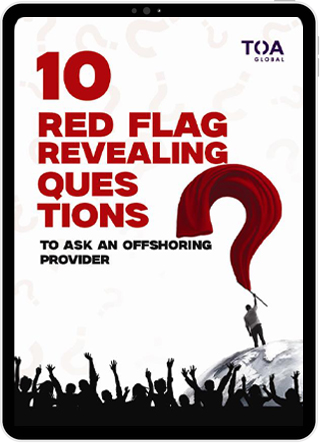Key Takeaways
- Tax preparation outsourcing is when an accounting firm hires an outside provider to handle tax return preparation, tax filing, strategic tax planning and estimates, and overall tax compliance.
- Tax preparation outsourcing reduces costs, saves time, supports compliance with the law, and frees your team up for advisory work, with all of these benefits extending well beyond tax season.
- Tax preparation outsourcing may raise concerns about data security and quality control, but the right outsourcing partner can effectively mitigate these issues.
Most people would think that outsourcing is primarily for low-yield administrative tasks. However, it has evolved into a strategic approach for accomplishing more complex tasks, like tax preparation, filing, and planning. Across the US, more accounting firms are outsourcing their tax-related tasks for several compelling reasons. If your firm has not yet adopted this practice, you may risk falling behind competitors who are already gaining an advantage.
Let’s take a closer look at tax outsourcing and explore its benefits for you and your firm.
Table of Contents
What is Tax Preparation Outsourcing?
Tax preparation outsourcing occurs when an accounting firm hires an outside provider to handle tax-related tasks, particularly tax return preparation and its associated processes. This means that instead of employing tax professionals in-house, you get help from trusted third-party tax preparers to minimize tax liabilities, submit your tax returns accurately and on time, file your tax extensions, make data-driven tax forecasts, and leverage tax software for maximized efficiency.
Why Outsource Tax Preparation Services?
You should outsource tax preparation services because they’re fast, cheap, compliant, freeing, and flexible. Outsourcing tax preparation services bolsters your firm during heavy tax season, with global talent teams confidently and workloads with increased ease and confidence, given that you work with the right outsourced tax preparers.
We’ll break down these benefits below.
Outsourcing tax preparation is cheaper

Cost savings are the primary selling point of tax outsourcing.
Most accounting firms pay their in-house tax specialists, say, approximately $6,800 per month. Meanwhile, outsourced tax specialists typically receive around only $1,000 a month, which is mainly due to lower labor costs in offshore territories such as the Philippines or India.
These significant savings in direct labor expenses are the key to helping scale and grow your firm much faster than your competitors: For every onshore tax specialist, you can get six offshore workers.
But more than the cost savings, it’s gaining access to US-trained tax experts with diverse skills and techniques that also make all the difference. Your outsourced tax teams can lower your firm’s tax burden, make accurate tax estimates, and drive strategic tax planning just as effectively as an onshore team can.
Outsourced tax preparation gets more tasks done

Another outstanding advantage of tax outsourcing is the time savings it offers during tax preparation. As your outsourced tax team grows, tasks are distributed, and more work is done in less time. This frees up time for your onshore team to focus on other things.
Additionally, outsourced tax preparers are known to be technologically adept, so they generally don’t rely on legacy systems and manual tax prep approaches. Instead, they utilize automation tax software to speed up and streamline their day-to-day processes.
Some tax software that most outsourced tax preparers use includes TurboTax, CCH Axcess, and GoSystem Tax RS.
Outsourcing tax preparation avoids trouble with the law

If you’re concerned about your staff’s competence in legal tax compliance, then leave it to outsourced tax specialists and their future-focused efforts in training and acquiring certifications for US tax laws. With numerous accounting awards and certifications to their name, outsourced tax specialists regularly and proactively study US tax regulations, including IRS laws and state-specific tax rules.
Their ahead-of-the-curve actions help your practice stay up-to-date with tax law changes, pay the correct fees, adhere to the set deadlines for tax document submissions, and more.
Outsourced tax teams also closely collaborate with your onshore tax specialists, who also regularly review complex tax laws and provide the necessary guidance to your outsourced tax teams.
Tax outsourcing services let you focus on advisory

Tax season is undoubtedly a busy season, which can divert your attention from core business activities, such as developing data-driven budget strategies or planning your firm’s entity structure.
With an outsourced team of tax specialists, that burden is taken off your plate, allowing you to concentrate on client-facing tasks, such as providing advisory services. This shift enables you to offer more in-depth insights to your clients, which not only bolsters your relationship with them but also solidifies your firm’s reputation.
Tax preparation outsourcing services aren’t limited to tax season

Some would think that tax preparers are exclusively useful during peak tax seasons, but they can actually provide year-round value for your firm.
Once the rush of tax filings slows down, outsourced tax professionals can transition into other roles, such as bookkeeping, payroll processing, or AP/AR management. Many outsourced tax teams can also help with financial statement preparation, estimated tax calculations, responding to IRS or state notices, and even audit support.
Outsourcing Tax Preparation: Common Concerns

While the benefits of tax outsourcing are clear, it’s normal for firm owners to have their doubts. Questions about data security and the quality of outsourced work often come up, and they’re valid concerns. We’ll be addressing them below.
Data Security Issues
As tax work involves highly sensitive information, such as social security numbers, income details, banking data, and business financial records, it requires Fort Knox-level security.
Naturally, sharing this information outside the firm, especially with outsourced tax teams, raises fears about unauthorized access, data breaches, or misuse. Firm owners may also worry about compliance with data protection regulations, such as IRS standards, GDPR, or state privacy laws.
Concerns on Quality Control
In addition to concerns about client data safety, firm owners may also fear that outsourcing tax preparation may lead to potential errors or inconsistencies. Tax teams outside the firm may also lack familiarity with client-specific nuances. In the broader context, some firm owners may also worry about reduced oversight or lower attention to detail, especially when multiple providers are involved.
How Outsourcing Maintains Security and Quality
Here’s the upside: Challenges on data security and quality aren’t roadblocks if you work with the right outsourcing partner. In fact, real data and industry best practices show how firms are overcoming these issues and outsourcing with confidence.
As the industry evolves, so do data security guardrails and quality control techniques. Firms want stringent security measures to make sure that data is protected at every stage of the outsourcing process. They also ensure intensive quality checks for a data-true, error-free, and time-targeted tax preparation process.
This includes cybersecurity best practices, such as multifactor authentication and regular software updates, as well as best hiring and training practices for tax accountants to ensure a highly qualified team from the outset and minimize any concerns about quality.
How to Outsource Tax Preparation?

Unsure where to begin your tax outsourcing journey? You can get started by learning more about the types of skilled tax preparers you’ll be working with, as well as the best possible places to outsource experienced tax professionals.
Types of Outsourced Tax Professionals
Freelance tax professionals usually work independently and take on clients directly. They can be affordable and flexible, but quality and consistency often vary. Meanwhile, we have contractual or project-based tax professionals, who can help fill immediate gaps, but lack the long-term sustainability of full-time hires, often requiring firms to repeatedly go through the cycle of hiring and rehiring.
Tax staffing solutions providers, on the other hand, offer a structured outsourcing model. They recruit, train, and manage teams of qualified tax professionals, often with oversight from CPAs and established quality controls. This ensures consistent standards, reliable turnaround times, and compliance with US tax laws.
Where to Outsource Tax Professionals
As noted earlier, tax teams are often sourced from countries with lower labor costs. Among the many options worldwide, five consistently stand out as top destinations for outsourcing tax specialists.

The Philippines

India

Mexico

Colombia

The Philippines

India

Mexico

Colombia

Thailand
While countries such as India, Mexico, Colombia, and Thailand are strong outsourcing hubs, the Philippines consistently stands out as the premier choice for tax outsourcing. Its unique combination of industry expertise, language, and cultural advantages makes it a compelling option for firms seeking reliable support.
This is what we’ll be diving into next.
Why Outsource a Virtual Tax Accountant in the Philippines?

What sets Philippine-based tax accountants apart from other virtual or remote tax accountants? Here’s a quick list that makes them a standout choice from a multitude of options.
There are many US-accredited CPA tax accountants from the Philippines
Since July 2024, Filipino accountants have been allowed to take the US CPA exams in their home country. US-accredited Filipino tax CPAs are equipped with the right skills and qualifications to practice in your accounting firm and even integrate with your onshore team.
Filipinos effortlessly break global language barriers
Based on the 2024 English Proficiency Index (EPI), the Philippines boasts a high level of English proficiency, ranking 22nd out of 116 countries. With a global team of fluent English speakers, your firm can share financial information clearly and ensure numbers are always reported accurately.
Philippine-based tax accountants are culturally aligned with the US
With its historical ties to the United States, the Philippines has adopted many aspects of American culture, including language and business practices. This cultural alignment allows Philippine-based tax accountants to work seamlessly with US firms and clients.
Elite Tax Accounting Professionals from TOA Global
Outsourcing is the most dependable, efficient, and risk-averse option for tax preparation. With talent solutions providers like TOA Global, accounting firms gain access to scalable tax teams, proven processes, and built-in oversight during both low and high-volume seasons.
Get our US-trained tax accountants on board and grow your firm with confidence. Talk to us for a no-charge, obligation-free consultation.























